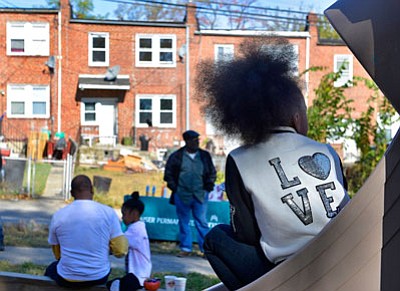Kaiser Permanente has committed to a long-term investment to promote health, wealth and equity for youth and adults in three of Baltimore City’s most vulnerable neighborhoods.
“We’ve had a partnership with Bon Secours for over a year and there’s been a lot of work and planning,” said Maritha Gay, the senior director of external affairs at Kaiser Permanente, which prides itself in being trusted partners in total health, collaborating with individuals to help them thrive, and creating communities that are among the healthiest in the nation.
This month, the medical giant announced a $1.7 million commitment to launch a neighborhood revitalization project in partnership with Bon Secours that they say will advance health equity and economic opportunity in West Baltimore.
The key component of the project will be the construction of a community resource center that will serve youth and adults with economic, health and social services, supported by an array of local partners.
The partnership between Kaiser and Bon Secours will, within five years, support the establishment of new businesses, decrease the zip code’s unemployment rate, and make new mental health services available for residents, according to a news release.
“It’s in our DNA, our mission, to improve the health and well-being not only of our members, but the community,” Gay said. “There are a lot of issues other than the typical health issues. There were broader issues that were brought to light around poverty, and we did a needs assessment looking at and addressing the issues.”
Kaiser officials noted an eagerness by the company to partner with Bon Secours to work toward making Baltimore one of the healthiest cities in America.
They say that economic security has a tremendous effect on the health of both individuals and communities, and believe the partnership will create comprehensive support going beyond what either company may be able to accomplish on its own.
The first of its kind effort in West Baltimore, will serve as a model for community health and development projects across the region and the country, according to Celeste James, Kaiser’s director of community health.
“Through this initiative we are really focused on, and committed to the partnership and we’re really putting a premium on community engagement because community input is essential to change,” James said.
The primary goal is to rebuild the social, emotional and economic fabric of the community. As Kaiser’s presence in Baltimore grows, the organization’s commitment to addressing core drivers of health— comprehensive health care, supports for mental health and economic opportunity— is a top priority.
Recently, the company launched the Institute for Equitable Leadership, which brings together nonprofit and for-profit leaders serving Baltimore City for coaching and training to strengthen their organizations and to develop leadership skills grounded in equity, diversity and inclusion.
Kaiser is also expanding a 2016 pilot program with local barbershops and beauty shops to offer no-cost preventive health screenings. Last fall, a partnership with a West Baltimore neighborhood to renovate a park in Park Heights created a safe place for children to play.
Bon Secours officials also are excited about the partnership. The organization already serves West Baltimore with a comprehensive array of services including a 72 bed acute care hospital with medical and surgical services, comprehensive behavioral health services, same day surgery, imaging, an outpatient dialysis program, over 25,000 emergency department visits a year, more than 4,300 discharges annually, over 725 affordable housing units in six Senior and two Family Housing Centers, numerous community outreach programs for men, women, expectant mothers, children, teenagers and seniors.
“We are committed to the long-term partnership that supports revitalization of West Baltimore,” said Dr. Samuel Ross, the CEO of Bon Secours Baltimore Health System and executive vice president at Bon Secours Health System, Inc., which owns the Baltimore Health System along with facilities in Kentucky, New York, South Carolina, Virginia and Florida. “We are truly grateful for the faith and trust they have placed in us.”
